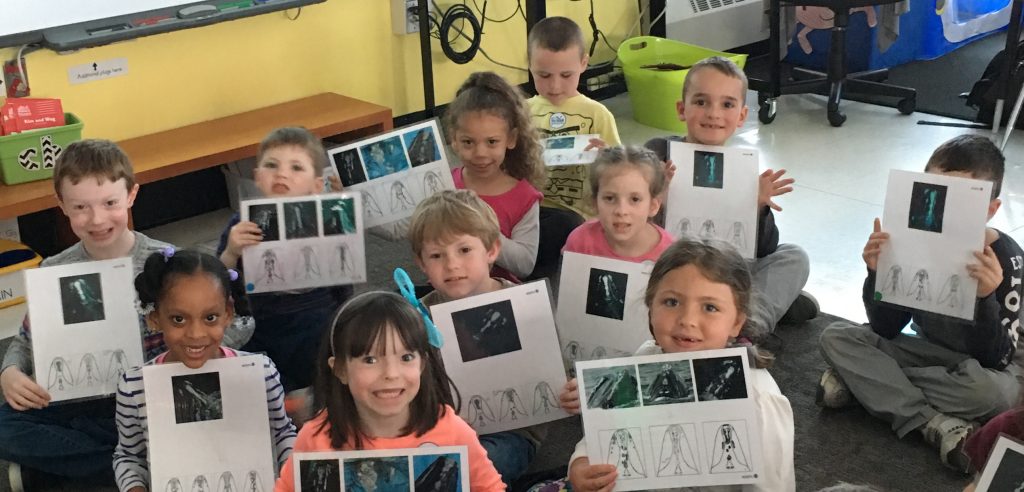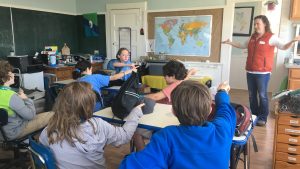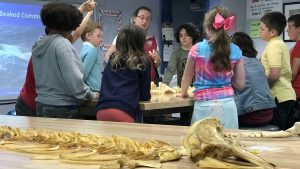Coasts, Oceans, and Stewardship Program Gets Kids Excited about Marine Science


In January 2018, Woods Hole Sea Grant launched an educational partnership with the NOAA Northeast Fisheries Science Center (NEFSC). The Coasts, Oceans, and Stewardship (COAST) Program brings current marine science research to local classrooms with exciting, hands-on lessons aimed at increasing students’ awareness and enjoyment of their coastal resources. With this partnership, the program expands the NOAA Outreach and Education on Protected Species Program (NOEPS) to become the COAST Program with enhanced content, activities, and resources.
When Grace Simpkins joined Woods Hole Sea Grant in January of 2018 as their education specialist, she brought with her this unique collaboration with NEFSC. NOEPS is a program of school-age marine science lessons Grace helped to develop with members of the Protected Species Branch at NEFSC. NOEPS lessons provide core educational materials relating to key marine mammal and protected species topics and research conducted at NEFSC and are delivered through one-hour classroom visits, provided digitally for teachers outside the local area and adapted for outreach and STEM events.

“It’s been an organic process. We’ve put a lot of thought into each period of growth,” says Grace.
Grace has a Master’s degree in marine biology from the University of Alaska. She has had numerous experiences teaching, including work as an educator in the Pacific Science Center’s mobile “Science on Wheels” program, which traveled to schools across the state of Washington, setting up a school exhibit space, performing school wide assemblies, and visiting each classroom in the school with various lessons.
“The NOEPS/COAST classroom model is similar to what we did at the Pacific Science Center,” Grace says. “Our goal is to take the marine research that we’re doing and turn it into something hands-on that kids can experience in the classroom.”
The program goes into each class every year, offering different lessons to each grade level and aligning them with the subjects taught in those grades. The lessons cover a variety of marine topics such as local marine mammal species identification, adaptations and climate change, food webs, and how marine mammals use sound. No matter what the topic, the lessons always include a stewardship element aimed at learning about and respecting the local environment and thinking about how students can enjoy their coastal resources in a sustainable way.
The lesson ends with a scientist spotlight featuring a local NEFSC scientist and either a Woods Hole Sea Grant or WHOI scientist that does the kind of science discussed in the lesson. “So I say to the students, ‘If you see this person at the grocery store, say hello and tell them you did their science today and that you had a lot of fun doing it.’ We want these kids to start thinking of themselves as scientists. It’s important to make the point that what we did today is both fun and important and that those careers are open to them. I tell them, ‘You were a marine scientist today!’”
After every lesson, all the students receive a sheet of stickers related to the topic. “Stickers are fun for them, but it’s also a tool to expand our reach and let the parents know we were there. I’ll say, ‘Your homework assignment tonight is to tell one adult you live with something you learned today. If you forget, these stickers will serve as a reminder and give you something to talk about.”
Next year, Grace plans to expand the program’s offerings to include a River Herring lesson, working with Abigail Archer, an extension agent with Woods Hole Sea Grant and the Cape Cod Cooperative Extension, and a Sea Turtle lesson, working with scientists at NEFSC. After that, she hopes to add a lesson on aquaculture.

The program’s numbers are impressive. During the 2018 – 2019 school year, the COAST program reached 156 classrooms and about 3,300 students in nine different districts including Barnstable, Boston, Falmouth, New Bedford, and Plymouth, Mass., as well as schools in Maine, New York, Pennsylvania and Texas. By getting kids excited about science early in their lives, the COAST program is helping to shape the next generation of scientists.
